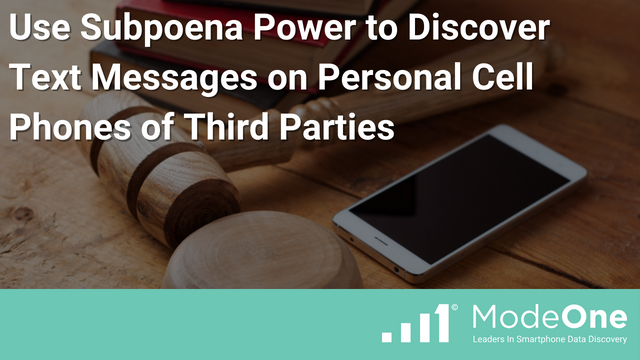Courts are generally reluctant to allow a party to discover personal cell phone data where the opposing party does not have possession, custody, or control of an individual’s cell phone data during the relevant discovery period. Why?
The scope of discovery is subject to constraints on relevance and proportionality. Fed. R. Civ. P. 26, 34. Personal cell phones contain email, phone logs, text messages, photographs, and other personal and business data that may not be relevant to the case. When it is unclear to what extent personal cell phones were used for business purposes, courts often find the full imaging of them in discovery overly broad and unduly burdensome and intrusive if there is a disproportionate amount of personal information irrelevant to the case.
What can you do when third-party individuals may have used their personal cell phones beyond a party’s possession, custody, or control to send text messages relevant to litigation? ANSWER: Subpoena the individuals as third-party witnesses to put them on notice to preserve evidence. Such was the case In a class action lawsuit alleging that Hormel Foods Corporation, a large pork producer and integrator, conspired to limit the supply of pork and fix prices in violation of federal and state antitrust law by, among other things, exchanging detailed, competitively sensitive, and closely guarded non-public information about prices, capacity, sales, volume, and demand over personal phones. In re Pork Antitrust Litigation, 18-cv-1776 (D. Minn. March 31, 2022).
The plaintiff’s first request for production sought communications and documents, including text messages and cloud backups or archived text message data between thirty custodians. Hormel successfully objected that it did not have possession, custody, or control of the custodians’ personal cell phone data. But the plaintiffs also subpoenaed the custodians directly for the information.
When the custodians’ counsel interviewed them to determine whether they may have had potentially responsive communications on their cell phones, only a small group reported using personal cell phones for work-related text communications external to Hormel during the relevant period.
Subpoena Power to Discover Text Messages
The scope of discovery for subpoenas is the same as those under Rules 26 and 34—they are subject to the same constraints on relevance and proportionality. Fed. R. Civ. P. 26, 34, 45. Even if a subpoena seeks relevant information, discovery is not permitted if it imposes an undue burden on a subpoenaed custodian.
The court was not satisfied with the inquiries of the custodians’ counsel and the representations by the custodians that a reasonable search was done for responsive texts. The court did not find that the requests for cell phone data represented an undue burden on the custodians that was disproportionate to the needs of the case.
The court did recognize that depriving the custodians of their phones during discovery was inconvenient, perhaps burdensome, and costly. The court shifted the cost of discovery between the parties and found that the custodians did not diligently explore alternatives to mailing their phones or traveling to Hormel’s e-discovery/data collections vendor. Although the court accepted that modern smartphones stored much of their owner’s personal, private, or confidential information, it found that the custodians’ privacy concerns could be alleviated via use of targeted search processes.
Using subpoenas to discover relevant text messages from custodians’ personal devices triggers a duty to preserve for third-party witnesses who would otherwise not have the duty. In an employment discrimination case deposition, a plaintiff’s former direct supervisor testified that he texted his boss on his personal phone about the plaintiff “[o]nce or twice.” Yet, he was unaware of any duty to preserve text messages on his personal phone. The former supervisor claimed he deleted all his text messages within 48 hours. Although a spoliation sanction got the plaintiff five additional interrogatories and three additional requests for production, the deleted text messages were not discovered. The result may have differed if the plaintiff issued a subpoena for the text messages. Miramontes v. Peraton Inc., 3:21-CV-3019-B (N.D. Tex. June 6, 2023).
If your case requires discovering text messages on third-party personal phones, issuing a subpoena can trigger a duty to preserve. Should your opposing party object on relevance and proportionality grounds and that the discovery imposes an undue burden on the third parties, explore ModeOne’s technology that removes the burden and expense of smartphone discovery.
ModeOne’s SaaS solution enables a digital forensics technician to define the date ranges and data sources relevant to a matter. Its patented framework gains remote access to the smartphone only after receiving the custodian’s advance permission, locates the targeted/relevant data stored on the phone, and securely transfers it to ModeOne’s cloud storage on Amazon Web Services (AWS), where it is encrypted and stored for review. Attorneys can search and review relevant messages in a threaded format and download selected notes in a format compatible with any electronic discovery review platform.
